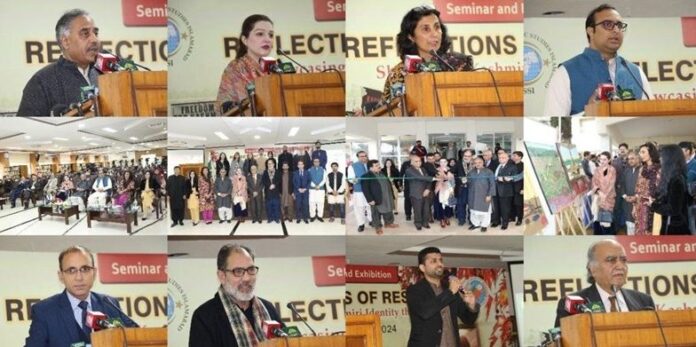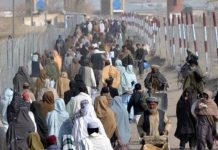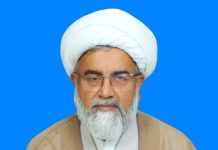ISLAMABAD, FEB 2: /DNA/ – In connection with commemoration of Kashmir Solidarity Day, the India Study Centre (ISC) at the Institute of Strategic Studies Islamabad (ISSI) organized a Seminar and Exhibition on the theme of “Reflections of Resilience: Showcasing Kashmiri Identity Through Art.” The primary purpose of the event was to go beyond the political and diplomatic lenses and to view the Kashmiri resistance from the art, literary and cultural prisms.
The Seminar brought together Kashmir movement’s political figures, academics, artists, and think-tank experts to share their insights on the distinct Kashmiri identity and the Kashmiri struggle for self-determination.
The Chief Guest on the occasion was Ms. Mushaal Hussein Mullick, SAPM on Human Rights & Women Empowerment. The Seminar commenced with remarks by Ambassador Sohail Mahmood, Director General, ISSI. This was followed by a short documentary on Kashmiri resistance towards illegal Indian occupation. The speakers included: Dr. Memoona Khan, HoD Fine Arts Department, FJWU, Rawalpindi; Sardar Waheed Khan, Commissioner, Muzaffarabad, Azad Jammu & Kashmir; and Mr. Altaf Hussain Wani, Chairman, Kashmir Institute of International Relations (KIIR). A young Kashmiri artist, Zohaib Zaman, presented musical rendition of a patriotic Kashmiri song.
Ambassador Sohail Mahmood, in his remarks, expressed gratitude to the speakers, attendees, and the students who took part in the accompanying art competition. He emphasized that art transcends the traditional boundaries of resistance and showcases the political struggle of Kashmiris under Indian illegal occupation and relentless oppression. The art Exhibition, organized today, underscores the power of artistic expression and encapsulates the essence of the Kashmiri struggle, he said.
Ambassador Sohail Mahmood further said that the accompanying Exhibition focuses on the exquisite artistic prowess and the celebration of Kashmiri culture and literature. This also serves as a reminder that Kashmir is not a just regional hotspot, but also a matter of profound concern for the international community. A peaceful resolution of the dispute, upholding the right of self-determination of the Kashmiri people, remains imperative.
Ambassador Sohail Mahmood underlined that art is the voice of the unheard and each stroke of the brush or each word flowing from the pen is a reminder of the conflict-stricken land and the trauma, resilience and collective struggle of the Kashmiri people. In this context, he recalled the poetry of Agha Shahid Ali, the cartoons of Mir Suhail, the artworks of Malik Sajad, and the novels of Basharat Peer and Mirza Waheed. The DG ISSI advised not to assume art as just brushstrokes, but rather as an expression of emotions and lived experience of a people enduring unabated repression but still fighting for their rights. He termed artists as torchbearers of the stories of Kashmir that must touch global consciousness.
Ms. Mushaal Hussein Mullick appreciated ISSI’s initiative to engage the young Pakistani and Kashmiri artists, to explore the heritage and culture of Kashmir. She said today’s innovative event expresses solidarity with the Kashmiri people in a most meaningful way and helps uplift the spirits. She shared her own passion for the arts and highlighted her personal contribution to depicting both the beauty of Kashmir and the travails of its people under occupation. She also compared the struggle of the Kashmiri people with that of the Palestinians.
Ms. Mushaal Mullick highlighted that New Delhi has depended on its cultural diplomacy to project a softer image of India to the world; whereas in reality the RSS-led ‘Hindutva’ brigade in Occupied Jammu and Kashmir continues to attack the Kashmiri leadership, Kashmiri people, and even foreign tourists. She added that India has propagated a negative narrative of Kashmir through films that project the wrong image Kashmiri culture and identity. An occupier, she emphasized, depends on obliterating the original culture and identity of the occupied people and replacing it with its own identity and culture. She said that this is what India is doing by changing the demographic structure in IIOJK and seeking to implant Hindu culture in the occupied territory.
Ms. Mullick said that art is freedom of expression, but only one percent of Kashmiri businesses have the license to export Kashmiri culture and artworks. She proposed collecting and disseminating Kashmiri art through the social media for the whole world to see. She also recommended using artificial intelligence, theatre, music, commercial films, infographics, literature, Kashmiri festivals, and coffee table books for the projection of Kashmiri struggle. She stressed that if there is no space left for peaceful expression, Kashmiris will only have one recourse, i.e. of armed resistance, a right which was recognised by international law.
Dr. Memoona Khan, in her presentation, showcased the powerful artwork of various resistance artists from history. She observed that the valiant yet heart-wrenching struggle of Kashmiris is going on through physical means but other mediums such as art is also being used to portray their resistance. She believed that among the types of books, the book of art is the most powerful. She criticized the so-called ‘democratic’ nation perpetrating atrocities in the occupied Jammu and Kashmir. Art is an important source to arouse the awakening of the world and, therefore, the work of Kashmiri artists needs to be preserved and presented to the world to raise awareness about their struggle, she concluded.
Sardar Waheed Khan apprised the participants of the historical political struggles of the Kashmiri people. He stressed the importance of Kashmiris and Pakistanis working together for the promotion of the Kashmir cause, along with Kashmiri diaspora living around the world. He stated that this idea of exhibition and showcasing the resistance through the art is appreciable. He noted that the resistance is adapting to challenges and life experiences that take a toll on mental and physical health. He also highlighted the development and rehabilitation work being carried out in Azad Jammu and Kashmir (AJK) to rehabilitate the Kashmiri people.
Mr. Altaf Hussain Wani opined that art is internationally recognized and has a wider reach and, therefore, must be promoted. He highlighted the work of prominent cartoonist Mir Suhail and his depiction of the struggle of Kashmir through art. He recommended that Pakistan must continue reaffirming solidarity with and standing by the Kashmiri people. Noting that India has demonized Pakistan and Kashmiris using its disinformation campaigns, he proposed protecting the Kashmiri culture and promoting a strong counter-narrative to India’s demonization campaign.
After the remarks, prizes and certificates were distributed among the winners and participants of the art competition. The Seminar’s proceedings were closed with remarks by Chairman BoG ISSI, Ambassador Khalid Mahmood, who stressed a peaceful resolution of the Jammu and Kashmir dispute in accordance with the United Nations (UN) Security Council resolutions and the aspirations of the Kashmiri people. The Seminar highlighted the importance of creating awareness about the Jammu & Kashmir dispute and the need for international attention to resolve the ongoing conflict.
Later, the participants saw the Exhibition and display of paintings, illustrations, artworks, and handicrafts, which was inaugurated by the chief guest SAPM Mushaal Hussein Mullick, flanked by other speakers and distinguished guests.

















